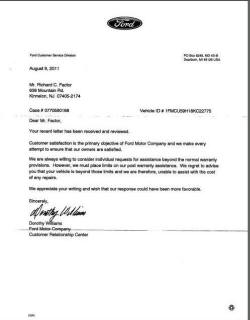RIKL Review: Ford Letter
We ended yesterday with "You won't be shocked if the text of their letter appears in a future blog, perhaps with its own RIKL Review."
No shock. Here it is.
It's Short
|
Dear Mr. Factor, Your recent letter has been received and reviewed. Customer satisfaction is the primary objective of Ford Motor Company and we make every attempt to ensure that our owners are satisfied. We are always willing to consider individual requests for assistance beyond the normal warranty provisions. However, we must place limits on our post warranty assistance. We regret to advise you that your vehicle is beyond those limits and we are therefore, unable to assist with the cost of any repairs. We appreciate your writing and wish that our response could have been more favorable. Sincerely,
Dorothy
Williams |
 |
It's Mostly Grammatical
I'm ambivalent about commas, and by no means an expert. I sprinkle them in where they sound good and try not to be compulsive about following the persnickety rules. I don't like the single comma after "therefore" and would, using conservation of punctuation, turn it into a hyphen and move it between "post" and "warranty." Other choices would be to remove it entirely or to replicate it and put its doppelganger in front of "therefore." Better balance.
It's A Little Confusing
The "Customer satisfaction" sentence-paragraph is a bit confusing, albeit truer than I think they intended. They, the "Ford Motor Company," make every effort to ensure that their owners are satisfied. Of course their owners are their stockholders, not their customers, so if by denying my request for compensation they are attempting to make their stockholders satisfied, then the letter says what it means. But I think that's a Fordian slip. They are really referring to their customers, and the "owners" means vehicle owners, not company owners.
It's Almost Content-Free
What does it mean to "review" my letter? Perhaps the reviewer is anonymous and is given only a "No" stamp, since there isn't a word about my particular issue or any indication that the review went beyond confirming that the letter existed (since it was "received"). They make "every attempt" to make sure customers are satisfied. "Every" is as inclusive as a word can be, and "attempt" would seem to imply that if they can do something, then they will. Did they "attempt" to reimburse me but fail, perhaps because they are down to their last dollar and know their check would bounce? No! Ford is the healthy automaker. "Attempt" I might believe from GM. But Ford?
They are "always willing to consider." Always, another inclusive word, that seems to have fallen short here, and the nature of their consideration is hardly pellucid. It is true, however, that they "must place limits" on post-warranty assistance. They would go broke, for example, if many unreasonable individuals requested a new vehicle every time the dome light blew out. Between excessive demands such as that as well as more likely ones such as mine and the routine warranty work they do pay for lies the "limit" which my vehicle is "beyond." It would be interesting to get a copy of the "limit" guidelines.
Finally, they "appreciate" my writing and "wish" that their response "could have been" more favorable. This is less compelling than the "must" above. If I were to give them three wishes, I don't imagine any of the three would have anything to do with a more "favorable response." But I love the positivity expressed by the sentence: Wish! Appreciate! Favorable!
Finally, the letter was signed by "Dorothy Williams." A perfect name for Middle America. Of course there was no telephone number on Ford's letter, and if there were and if I called it (which I wouldn't) and if I asked for Dorothy Williams who has no title but notionally works at the Customer Relationship Center, I wonder if I could reach her. (Whose turn is it to be Dorothy Williams today?)
Why Review A Letter?
Ford probably paid big bux for a writer and a focus group to tailor this letter to the intended audience, i.e., current customers who are unhappy. If you have customers you'd prefer to retain and don't want to just say "No, we're not giving you money," you could do worse than to appreciate and consider and be willing and, sadly, also limit and regret. Sometimes it will work.


